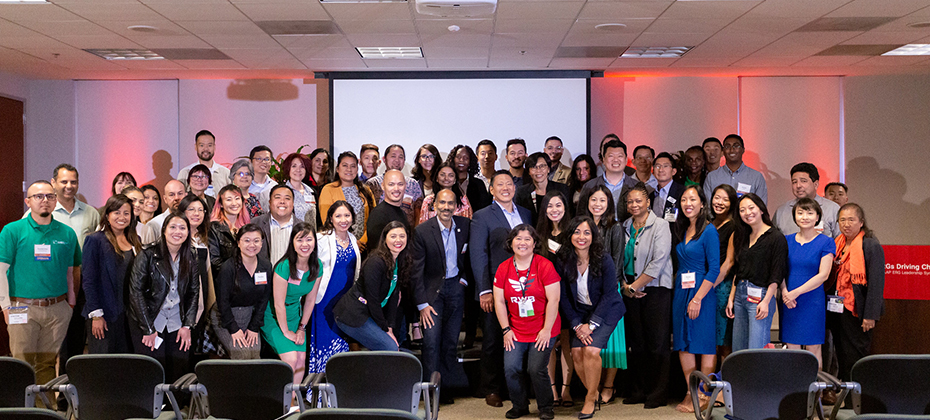All posts by Editor

In the United States, June is observed as Pride Month by the Lesbian, Gay, Bisexual, Transgender and Queer (LGTBQ+) community. The celebration is in remembrance of the 1969 Stonewall Uprising in Manhattan, a tipping point for the Gay Liberation Movement in the U.S. Pride is not only about the parades and flags, but about the celebration and commemoration of the contributions members of the LGBTQ+ community have made throughout U.S. history—and there are many. Though the beginnings of Pride Month originate in the U.S., Experian is committed to supporting and uplifting the LGBTQ+ community on a global scale. This year was an especially important year, marking both the 50th anniversary of the Stonewall Uprising and the one year anniversary of the inception of Experian’s Pride Network Employee Resource Group (ERG). Our Pride Network executive co-sponsors, Michele Bodda and Todd Rudie, say, "As our culture continues to evolve, we feel especially empowered by Experian’s demonstrated commitment to diversity and inclusion. With great support from our leadership, we launched the Experian Pride Network just one year ago and have achieved success beyond our aspirations." Earlier this year, for example, Experian earned a "2019 Best Place to Work for LGBTQ Equality" designation by the Human Rights Campaign (HRC). "We are proud to have achieved a perfect score on our very first submission to HRC’s Corporate Equality Index. This was a goal our ERG originally set out to achieve within three years," Bodda and Rudie stated. With so much to commemorate and celebrate, our Pride Network kicked off the month with numerous events around the world, including participation in official Pride parades, on-campus barbecues, bake-offs, spirit days, LGBTQ-focused webinars and so much more. It's important for us to not only provide a safe space for members of the LGBTQ+ community, but to also educate all of our non-LGBTQ employees about how they can be better allies. As part of the festivities, we had The LGBT Center OC conduct a webinar for ways we can develop tools and strategies for good allyship across the LGBTQ+ community and beyond. Here are some takeaways of what it means to be an LGBTQ+ ally: Allies have a deep understanding of LGBTQ+ people, terms, and experiences Allies speak up when they see discriminatory behavior Allies intervene in cases of bullying or harassment Allies always use the right name and pronouns for their transgender friends Allies recognize that they have privilege over other marginalized groups, and they want to use that privilege to help elevate the voices of the unheard Experian also hosted a webinar on navigating the workplace as a transgender individual. While several states have laws in place to protect transgender and gender non-conforming individuals in the workplace, harassment and discrimination are still large issues in the U.S. today. Here are some takeaways of what we can do to better support our transgender and gender non-conforming colleagues and friends: Understand the biases and hardships trans and gender non-conforming individuals face in the workplace — 75 percent of transgender workers experience discrimination, harassment, bullying, privacy invasion and suppression every day at work Know the laws in your state Empathize. You can do this by calling people by the preferred name/pronoun, refraining from making assumptions about others' sexual orientations and avoiding making assumptions that all trans people look the same or are going through a "transition" Be an ally — add gender neutral/all-gender restroom options, normalize the usage of pronouns, don't ask personal or inappropriate questions, etc. After taking measures to further educate ourselves, it was time to celebrate! Here are some photos from our Pride celebrations: Costa Mesa, CA Allen, TX Schaumburg, IL Clearwater, FL Costa Rica

As part of Experian’s commitment to the value of Employee Resource Groups (ERG), we recently hosted the National Association of Asian American Professionals (NAAAP) ERG Leadership Symposium, ERGs Driving Change at our Costa Mesa headquarters. ERGs are a proven strategy for organizations to advance a diverse and inclusive company culture. At Experian, we believe the culture of inclusion also cultivates and advances innovation with the added diversity perspective that strengthens the community of professionals and ideas within the company. We were proud to host the 13th ERG one-day training program that was organized by the NAAAP to help companies and employees advance their ERG experience and learn how ERGs are change agents to enhance productivity and grow professional networks in the corporate setting. Speakers represented companies leading their industry, such as Bank of the West, Macy’s, Anheuser-Busch, Google, Facebook, UPS, Northrop Grumman, Boston Scientific, and many more, including Experian. The symposium this year featured numerous ERG thought leaders sharing their insights across a variety of sessions and panels, including; Best Practices in Demonstrating Value, Creating Connections through ERG Leadership, What’s Next Action Plans for Your ERG, among others. Caption: Hiq Lee, President, Business Information Services for Experian, shared insights as a panelist for The Crucial Executive Role in Driving Change session. She was joined by Judy Ting, SVP, Pacific Rim Region Manager, Bank of the West, and DeAnne Aussem, Managing Director & Founder of U.S. Leadership Coaching Center of Excellence, PricewaterhouseCoopers, LLC. The panel was moderated by Farzana Nayani, NAAAP ERG Architect. All speakers provided valuable takeaways for the professionals in attendance to motivate their organizations to positively impact their company with the diversity amongst its workforce and implement strategies to leverage the power of inclusion. Specifically, the hundred-plus attendees learned more about how Employee Resource Groups and Business Resource Groups are change agents for diversity, inclusion, engagement, productivity, and connection-building within organizational settings. Justin Hastings, former Chief Human Resources Officer for Experian North America, welcomed the ERG Leadership Symposium attendees with his introductory remarks, as he shared Experian’s perspective on inclusion leading to innovation. Therefore, we asked him some questions to share his insights with us on Experian’s ERGs. 1. How is Experian creating a better tomorrow? Hastings: The consumer is at the heart of everything we do. Our product innovation is geared towards giving consumers more control over how their data can enrich their lives. Experian Boost is a perfect example of this coming to life. Inclusion underpins our ability to innovate. The more we encourage a culture where everyone’s creativity is valued, the more we are able to innovate for consumers. Our ERGs play an important role in promoting diversity, and creating an environment where all our Experian people can bring their whole selves to work and be creative. 2. What role does The Power of YOU have in Employee Resource Groups? Hastings: We created a workplace environment where everyone is comfortable bringing their whole self to work, regardless of differences or backgrounds. We call this The Power of YOU, which creates an environment for employees to be their true selves. We advance our company culture by not only respecting the differences amongst Experian colleagues, but actively celebrating them with and through our ERGs. 3. What impact does the Employee Resource Groups have on Experian? Hastings: At Experian, inclusion is vital to the success of the company. Our ERGs provide us with a platform to be a more innovative business. Our ERGs now have around 1,000 employees actively involved across the eight current groups. They have helped create greater understanding of different cultures that are represented in our company, and they have also underpinned our recruiting efforts across diverse talent pools. This has helped us to keep evolving our employee base to be increasingly representative of the communities in which we operate, and the consumers we ultimately serve. Learn more about Experian’s Employee Resource Groups by visiting: https://www.experian.com/corporate/power-of-you.html Learn more about the National Association of Asian American Professionals (NAAAP) by visiting: https://www.naaap.org/ All photos taken by Nhan T. Nguyen.

FY19 proved to be a great year for Experian – one of our best ever. We just announced results, with organic revenue growth of 9%. But that is only part of our story. Behind the company’s success is a strategy that puts consumers first. We have looked to respond to the challenge of financial exclusion around the world, by using data and innovation to bring more people into the mainstream financial system. And we have responded to rapid digitisation of the world by helping organisations of all shapes and sizes to respond and adapt, all through the power of data. Fintech and digital disruption have revolutionised the way people engage with their finances. At Experian we help to speed up applications for credit, check for fraudulent impersonators and improve access to credit at fair and affordable rates. During the course of this financial year, we delivered some major and exciting milestones in our markets: In North America, we launched Experian Boost, an industry-first, game changing offer that is reshaping the credit landscape by putting individuals in control of their credit score. In the UK, we are introducing a range of new innovations, Ascend, Credit 3D and Experian One, which deploy our advanced analytics, predictive data and SaaS-based platforms. We were the first in our industry to be granted approval to supply Open Banking and PSD2 services by the Financial Conduct Authority and we have rolled out new services which help to assess whether loans are affordable. In Asia Pacific, we are building out our data Marketplaces with our strategic investment and partnerships with C88 in Indonesia and Jirnexu in Malaysia. This move will help to increase levels of financial inclusion in the region by improving matching to eligible credit products. In South Africa, we agreed to the acquisition of Compuscan, which will mean we are better positioned to serve the people and businesses of Africa and be an enabler of growth in consumer and business credit, identity management and financial inclusion. To sum up, the financial performance is strong. Our commitment to using data and analytics to help consumers, businesses and society at large is even stronger.

For the past several years, Experian has been on a journey to help drive financial inclusion for millions of people around the world. This has required significant changes in how we operate, who we partner with, and the products and solutions we offer —and with those changes comes a renewed sense of purpose. What we do and the actions we take have the potential to improve lives. We are actively seeking out unresolved problems and creating products and technologies that will help transform the way businesses operate and consumers thrive in today’s society. But we know we can’t do it alone. That’s why over the last year, we have built out an entire team of account executives and other support staff that are fully dedicated to developing and supporting partnerships with leading fintech companies. We’ve made significant strides that will help us pave the way for the next generation of lending, while improving the financial health of more people around the world. Earlier this week, I attended the FinovateSpring conference in San Francisco to speak with fintechs and financial institutions about ways to put financial health at the center of an organization’s plans to build trust, reach new customers and ultimately grow business. We are developing platforms that are designed to play to the strengths of fintechs and disrupt the industry. In the past, we have looked at unresolved problems and asked ‘why?’ Today, with our fintech partners, we look at potential solutions to these unresolved challenges and say, ‘why not.’ As part of our concentration on fintech, Experian has made significant investments in alternative data, such as the game-changing Experian Boost platform, which was launched just two months ago and is already reshaping the way consumers gain access to credit. Since we launched Experian Boost, consumers across America have instantly increased their credit score by sharing their bill payment history for things like utilities, mobile phones and cable TV payments – payments which had never been factored into a credit score before. And, yes, this platform came to fruition as a result of a fintech partnership. We have partnered with fintechs in other powerful ways, too. Our new Ascend Analytical Sandbox – a first-of-its-kind data and analytics platform - gives companies instant access to more than 17 years of depersonalized credit data on more than 220 million U.S. consumers. This creates better opportunities for consumers by allowing our clients to provide more tailored solutions. It’s a great example of the power of analytics and we’re very proud of it. During our time at Finovate, we were able to engage in meaningful conversations with fintech leaders who were united in our goal of helping more consumers access the financial services they need. We’re more inspired than ever before to continue to build and explore strategic partnerships that will ultimately improve the lives of American consumers.

It gives me great pleasure to announce that Experian has won the Consensus Economics Forecast Accuracy Award 2018 for the UK. Our UK Economics Team was recognised for their high-quality research, their commitment to regular forecasts and their ability to identify most accurately the trends and levels of key indicators over the 24-month forecasting cycle. The Forecast Accuracy Award program recognises the achievements of a select group of expert country economic forecasters who have most accurately predicted the performance of GDP growth and Consumer Price Inflation for their targeted economies over a 24-month forecasting cycle. Experian were the most accurate UK forecaster out of pool of 36 organisations. Mohammed Chaudhri, Head of UK Macro Forecasting, said: “We’re thrilled to win this award. We spent a lot of time analysing the UK economy following the referendum vote in 2016 and, at the time, many forecasters were expecting an immediate recession. However, we felt that the UK economy would prove more resilient in the coming years. We are pleased that our forecast for 2018 was so close to the actual development.” The award underlines the wealth of knowledge across the UK Economics Team, with over 30 years of macro-economic forecasting experience to their name. The accuracy of our economic forecasts is a real benefit when understanding how the UK economy will impact businesses in the future. By embedding our forecasts into the decision-making process organisations can embrace the opportunities presented by an ever-changing economics landscape. I’d like to congratulate Mohammed and his team on a well-deserved award win, along with all the other winners from across the globe. To find out more, click here.

The following is written by Colin Grieves, Managing Director of Targeting, at Experian. There are many reasons why an advert might catch your attention - maybe it’s because of a celebrity endorsement, clever catchphrase, or a witty one-liner that catches you off guard when you’re waiting for your programme to return after the break. If there has been an advert that has particularly stuck in your mind, those behind the marketing at organisations will tell you it’s no accident. Experian works with a range of organisations to help them understand which people are likely to be most interested in. So, how can you find out what information marketers use to understand you? Experian launched the Consumer Information Portal, or CIP for short, back in April 2018 to help people see what data we have access to, but also to give you the chance to let us know if you want to stop your data being used for marketing. The CIP also explains why our work in marketing can be a good thing for consumers and society as a whole. We’ve recently made improvements to the website to give you an even greater insight. You can now visit our website and promptly check whether your personal data is present on specific marketing channels, what sectors it’s used by, and where we obtained the data from. For the first time, you can also see with which marketing profile your postcode is associated here. This gives you a real flavour of how marketers may view you and the type of people most likely to live in your neighbourhood, to make sure the messages you receive are as relevant as possible. We’re planning to keep adding more new features and information to the CIP, as we keep our promise to deliver transparent and responsible marketing. Drawing on expertise across our business to improve your experience when you use the CIP, as well as looking at new, clearer ways to explain how we work with data in our marketing services. Watch this space for further updates.

Charles Butterworth talks about the acquisition of leading South African companies Compuscan and Scoresharp Today we announced the completion of our acquisition of Compuscan and Scoresharp in South Africa. This exciting moment creates a single, united Experian organisation that brings together the best of all we offer, not only for South Africa, but the wider African continent. Compuscan’s agile approach has driven its rapid expansion into six Sub-Saharan African countries, alongside emerging business in Australia and the Philippines. Combining Experian’s proven digital strategy with Compuscan and Scoresharp’s cost-effective operating model gives us an excellent foundation for Experian to expand into Africa. This is a commitment we’re serious about, and we’ve made the public commitment to spending at least R120 million on technological enhancements as part of establishing South Africa as an investment hub. For our clients and partners, this acquisition will see the combined organisation bringing new innovations to market, faster and at scale, enabled by our shared bureau data. Delivering additional resources for credit bureau information, decision analytics, marketing services, loyalty & rewards, and training. Allowing us to be more agile, more flexible, and to respond faster to the need of all the organisations and the people we serve. More importantly, this is a chance for us to drive financial inclusion across the region. It’s our intention to use this acquisition to accelerate our financial inclusion goals, bringing many more people into the credit economy and helping us create a better tomorrow for millions. I am delighted to be welcoming Compuscan and Scoresharp to the Experian family, and I am excited about the opportunities that lie ahead as we drive towards our goals of greater financial inclusion and better data management across South Africa and beyond.

Technology revolutionizes the way businesses operate, but implementing change within a company is often challenging. Company-wide support is vital to successfully undergo a transformation. At Experian, in 2015, we underwent the task of moving from a traditional computing architecture to the cloud. This is a monumental transformation with our massive digital infrastructure and significant global reach, but it enables us to provide customers with real-time access to data. This journey is featured in the new book, Cascades: How to Create a Movement that Drives Transformational Change, by Greg Satell. Last year Satell’s first book shone a light on Experian’s innovation story. In his latest book he talks about the power of cascades - small groups, united with a common purpose - to drive transformational change within businesses. He gives examples of how some companies succeed, while others fail. Satell uses Experian as a case study and highlights how changes to our culture, organizational structure and skills is allowing us to adopt new technologies quicker, in better collaboration with our customers, to get cutting-edge, innovative products to market faster. At Experian, we believe in the culture of inclusion, which brings a culture of innovation with the added diversity perspective that empowers our people to continue to evolve and create valuable additions to the company during this transformation. Our philosophy is about advancing a culture that not only respects differences, but also actively celebrates them. In Cascades, Satell writes about the idea of small groups, loosely connected, but united by a common purpose. We asked the author for his thoughts about Experian’s technology journey, which he refers to as our digital transformation, and why he’s used Experian as a success story in his book. Q. What are your thoughts about Experian’s digital transformation so far? Satell: What attracted me to the Experian story was how closely it tracked with so many of the social and political movements I researched for my book. Senior leadership at Experian didn’t just try to push its digital transformation through. Rather, they identified those who were already enthusiastic and empowered them to bring others into the fold and they, in turn, could bring others in. That's how you create a cascade that leads to transformational change. Q. What has impressed you the most about Experian’s digital transformation, from both technology and human perspectives? Satell: What I found most impressive is that Experian is able to break free from decades of legacy and build a new future for itself. That's a very hard thing to do. You have all this infrastructure that served the business so well for so long. I mean you're talking about decades of investment. Still, the company leadership was able to step back and say, ‘That's our past and we're proud of it, but it's not our future’, and move forward from there. Q. Have you seen any examples of how our digital transformation is driving innovation within Experian? Satell: Well I think it has driven a lot. Things like Experian’s Analytical Sandbox, the Ascend platform and much of the current work around Artificial Intelligence (AI) wouldn't be possible without moving to more of a cloud infrastructure.

Inclusion is at the heart of everything we do, and we’ve made it a priority to embrace the diversity that makes up the Experian family. This is why we’re especially proud to release our 2018 The Power of You Inclusion & Diversity Annual Report, highlighting the strides we’ve made to celebrate our diverse work force and create an inclusive company culture. "We believe that embracing a truly inclusive culture, where everyone has a real sense of belonging, is critical to building a diverse workforce and fostering innovation," says Craig Boundy, former chief executive officer of Experian North America. "We don't just encourage inclusion at Experian, we celebrate it." The Power You initiative was created to recognize ways we can create a more supportive work environment and provide greater transparency into our commitment towards diversity and inclusion. We’ve instated progressive policies and programs, such as flexible working, paid parental leave and Experian clubs, to help foster support, empowerment and employee pride about working for Experian. Here are some of the highlights from the report: 89 percent of employees across North America agree that creating a diverse and inclusive work environment is at the forefront of Experian's values More than 900 employees joined our 8 Employee Resource Groups (ERGs) From 2017 to 2018, the percentage of women hired into executive positions increased from 31% to 38% Nearly half of our job applicants were non-white, a 10% increase from 2017 Volunteer Time Off (VTO) was increased from one day to two days Experian North America was honored with a North America Great Place to Work certification and regional Top Workplaces awards From the events organized by our Employee Resource Groups (ERGs) to the support provided by our Experian Hardship Fund, The Power of You initiative is exemplified by the work and dedication our employees have invested to help in our mission to create an inclusive workplace. "Creating a better tomorrow starts within the company, and that's why we're committed to diversity and inclusion," adds Justin Hastings, former chief human resources officer of Experian North America. "We search the globe for the very best people so we can innovate and meet the needs of our increasingly diverse clients. Drawing on this collective strength is what truly makes us a top workplace." Our dedication to creating a more inclusive and supportive workplace has not gone unrecognized. We’ve been honored with a number of high-profile employer awards, including being named the #1 Top Workplace in Orange County by the Orange County Register and one of the World’s Most Innovative Companies for the fifth consecutive year by Forbes Magazine. Innovation starts with creating an inclusive culture and growing a diverse workforce. We are proud of the supportive work culture we’ve created and will continue finding ways we can further build upon the progress we’ve made. A copy of this year's report can be found here. Photos taken by Nhan T. Nguyen.